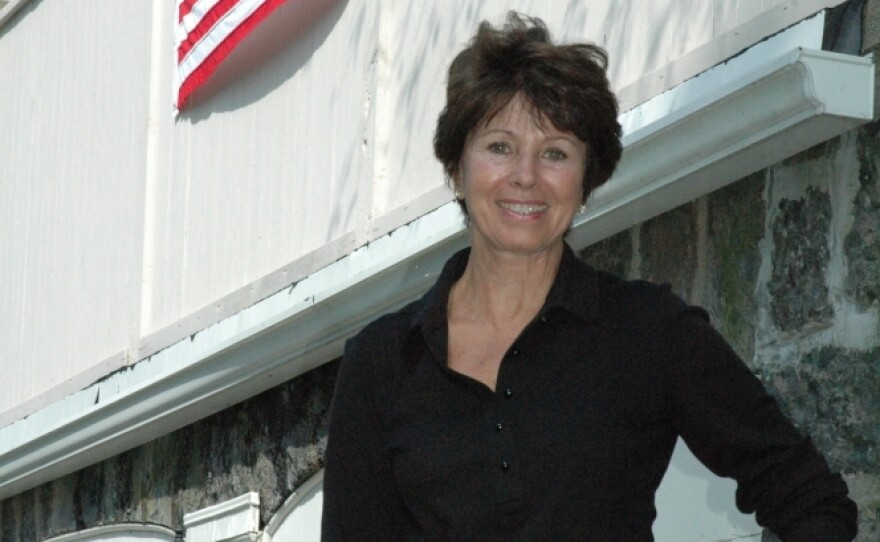Residents are waving the flag in Brookline, Mass., both for — and against — the Pledge of Allegiance.
Courts have ruled that public schools cannot compel students to recite the pledge, so in Brookline, as elsewhere, the pledge is voluntary.
But critics say there's still pressure on students to conform, and they want the pledge out of the classroom altogether.
A Concern About Peer Pressure
Brookline parent Martin Rosenthal says he is very patriotic. He proudly put his hand on his heart and pledged allegiance to the flag at a recent community event. But, he says, the pledge has no place in the classroom.
"You're asking kids in school to take a loyalty oath in front of their classmates," he says. "I just don't think that's right."
Rosenthal says the pledge has no educational value and even flies in the face of the kind of critical thinking schools should be teaching. But, he says, he's most bothered by the peer pressure students may feel to recite it.
"It's like if you don't agree with the group, we're gonna ostracize you," he says. "If you don't swear allegiance, you're considered disloyal. That's what I'm getting."
Since he filed his proposal, Rosenthal says he's been assaulted by calls and emails that prove his point — messages like "Go f - - - yourself you socialist pig," and "You liberal a - - - - - - - are ruining this country."
"I mean, I have a thick skin, but I don't think it's right to put 6- to 7-year-olds in that situation — and the school committee doesn't get it," Rosenthal says.
School committee Chairwoman Rebecca Stone says no students have ever complained they were bullied for not pledging. And schools are very careful to make sure the pledge does not feel coercive.
"We don't have a problem," she says.
Kids Say They Don't Feel Pressure
At Brookline's Runkle School, as in most, the pledge is led once a week over the intercom.
"Nobody should be asked to stand, nobody should be asked to salute, or to place their hands over heart; they are not told how to respond," Stone says. "They are given the opportunity to hear and recite the pledge if they so choose."
After dismissal, outside another Brookline school, eighth-grader Noam Fink agrees that there is no pressure to pledge. In fact, she says, sometimes there's pressure not to pledge.
"I did it once," she says. "And I was one of three people standing up and it was awkward 'cause everyone was staring at you."
Pledging seems to be more common in the younger grades. Though, as fourth-grader Milena Kitterman puts it, it's up to you.
"If you wanna do it, it's cool to do it," she says. "But if you don't want to do it, you just sit in your seat and wait till it's over and it's no big deal."
She and classmate Kate Staff say they like pledging.
"It just feels very special to do it," Kitterman says.
"I feel like I'm really actually an American," Staff adds.
Stone says many in Brookline want more of the pledge, not less. "There is no question that this is a cherished, civic tradition — and cherished, civic traditions count for something," she says.
A Distraction
Indeed the flap over the flag ricocheted all the way up to the candidates for president. Speaking on Fox News, Newt Gingrich was indignant.
"I would hope that any tax-paid school will say the Pledge of Allegiance, and frankly I'd wonder whether taxpayers ought to subsidize it if it's not going to teach people how to be patriotic and how to be pro-American," he said.
In Brookline, equally enraged residents are now hanging flags outside their homes in support of the pledge. Resident Sandra Maloney says people should stop whining about peer pressure.

"Grow up," she says. "Part of growing up is having pressure put upon you so that you are able cope with life as you get older. We are trying to teach our children to stand up for themselves. This is part of education."
But at home, where his phone has been ringing nonstop, Rosenthal says the harassment he's experiencing is more than just teasing on the playground. The public threats even prompted the police chief to get involved.
For all the vocal opposition, there's been relative quiet from the side of civil libertarians. Even stalwart Harvey Silverglate came down in favor of the pledge in schools, saying it does have educational value. He says letting students wrestle with whether or not to pledge is kind of like Liberty 101.
"Let me tell you something — in an un-free country it's very easy because the authorities tell you what you have to do," he says. "So in a constitutional democracy, of course it's hard because you have to make your own mind up. But we should really thank our lucky stars that's what we've got."
Silverglate calls the whole debate over the pledge a distraction. But thanks to the First Amendment, he says, it's a distraction people have a right to raise.
Copyright 2022 NPR. To see more, visit https://www.npr.org. 9(MDAzMjM2NDYzMDEyMzc1Njk5NjAxNzY3OQ001))







